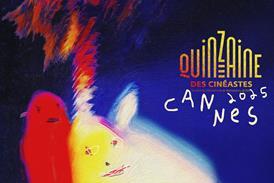Dir: Alejandro Agresti. Argentina/Holland. 2002. 82mins.
Valentin is an immensely likeable if lightweight addition to the existing host of nostalgic, bittersweet comedies about growing up in a dysfunctional family. Small but perfectly formed, it is keenly pitched at middlebrow art-house audiences and quality broadcasters. Miramax, which is also funding director Alejandro Agresti's next two pictures, is scheduled to release it in the US in early summer. Valentin was initially disbarred from competing in Mar Del Plata because of previous outings in Biarritz and the Netherlands, where Agresti is based, before being reinstated amid controversy. It went on to win the Special Jury prize there "for the poetry of its spirit" but may cost the festival its A-grade status for contravention of FIAPF regulations.
It is the late 1960s and, after his parents' divorce, eight-year-old Valentin lives alone in a too-large house in Buenos Aires with his grandmother, a grump with a heart of gold (Maura, oddly, but successfully aged-up). Lonely but resilient, he dreams of becoming an astronaut, his confidence undiminished by the fact that he wears thick glasses. Valentin's squint is also a metaphor for his quirky vision of the world, which Agresti underlines with slightly oblique camera angles. Born himself in Buenos Aires in 1961, the director claims the story is partly autobiographical.
Valentin's mother refuses to see him for reasons revealed only at the film's end. His self-centred father (Agresti) visits the boy occasionally with an ever-changing stream of girlfriends, promising that each new lover might be his next stepmother. Pragmatic Valentin has long since given up any hope of this until he forms an unexpected bond with one of the women (Cardinalli). But in his eagerness to cement their friendship he spills family secrets which drive her away.
The general scenario sounds a little over-familiar, but the film is slickly executed, with an excellent cast. Above all, it would take a heart of stone to resist the fantastically engaging performance of Rodriguo Noya as Valentin, by turns precocious, wisecracking and vulnerable, with charm to burn. Capturing both the humour and the pain of the character, Noya keeps the film the right side of whimsy and copes impressively with what could have been its biggest pitfall, the long swathes of voice-over narration.
Apart from the attractive, colourful period details, the film does not make much of the historical context nor political turbulence which rocked Argentina during the late 1960s. But it touches lightly on the mood of anti-Semitism (Valentin's mother and a kindly neighbour are Jewish), and a radical priest's sermon in praise of the Argentine born Che Guevarra on his death in 1967 receives a frosty reception. Above all, Agresti claims that Valentin's feistiness and his will to make the best of the crummy hand that life has dealt him is emblematic of "the incredible spirit of Argentinians, come rain or shine."
Prod cos: First Floor Features, Rossini Wsznia Agresti, DMVB, Duque y Castelao, Surf Films
Int'l sales: KMI
Exec prod: Eddy de Kroes
Prods: Laurens Geels, Thierry Forte
Scr: Agresti
Cienmatography: Jose Luis Cajarville
Prod des: Floris Vos
Ed: Alejandro Brodersohn
Music: Paul M Van Brugge
Main cast: Carmen Maura, Rodriguo Noya, Julieta Cardinalli, Agresti, Max Urtizberea


















No comments yet